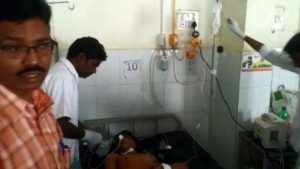Many people said they were shocked over footage of a teenage victim of a hit-and-run accident pleading with unresponsive onlookers to take him to hospital. This happened in Karnataka.
Local media reported people gathered around and took pictures and videos of the injured teen, but did not help him. How insensitive is that?
Anwar Ali, a 17 year old boy, was hit when a bus collided with his bicycle and drove off. was taken to hospital around half an hour later.
He bled to death.
Doctors said he could have survived if he had received medical care sooner.
The incident in Koppal district in Karnataka has revived controversy about people being reluctant to help road accident victims in India.
If no-one helps you after a car crash in India, this is why
Some activists argue that it is not a lack of compassion but an entire system stacked against helping road victims.
“The foremost reason is intimidation by police,” safety campaigner Piyush Tewari told the BBC. “Oftentimes if you assist someone the police will assume you’re helping that person out of guilt.”
Apart from the fear of being falsely implicated, people also worry about becoming trapped as a witness in a court case – legal proceedings can be notoriously protracted in India.
And if they helped the victim get to hospital, they feared coming under pressure to cough up fees for medical treatment.
In May last year, India’s Supreme Court ruled that “good Samaritans” would be protected from harassment. Karnataka has also passed a law stipulating that people helping road accident victims would not be subjected to harassment.
However, many people are unaware of the rulings and do not trust police to follow them. Maybe activists as well as the government in India should start a nation wide campaign educating both police and public not to harass ‘do- gooders’ who would help accident victims.
[Contributed by Daniel Wong]


